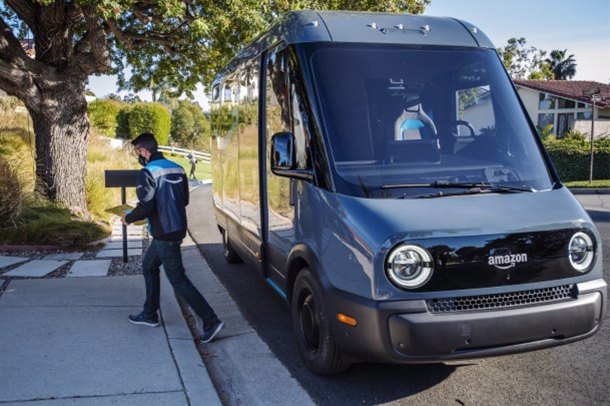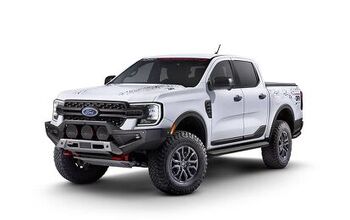Rivian Rolls Back Price Increase After Making Everyone Angry

On Tuesday, Rivian announced it would be increasing vehicle pricing by roughly 20 percent to account for higher inflationary pressures and higher component costs. It’s not the first electric vehicle startup to do so, or even the first automotive business that realized the hectic economic situation has created a window for expanding profit margins. But it was one of the few to get slapped in the face, metaphorically, after trying to get away with it.
Shares of the company began plummeting almost immediately as it endured widespread criticism, then people started canceling reservations. The plan would have made the $67,500 Rivian R1T electric pickup an $80,000 vehicle, while Rivian would have tacked on an additional $10,000 to the R1S SUV for a new ballpark total of $85,000. This included preorders, which would help to explain why everyone went bananas. But that particular aspect of the plan has been abandoned in an effort to save face and money.
Prices for preorders (as of March 1st) will roll back to their previous sum. Rivian CEO R.J. Scaringe even issued a formal apology, adding that customers who decided to cancel their orders can have them back at the original rates.
“Earlier this week, we announced pricing increases that broke the trust we have worked to build with you. Since originally setting our pricing structure, and most especially in recent months, a lot has changed. The costs of the components and materials that go into building our vehicles have risen considerably,” wrote Scaringe. “Everything from semiconductors to sheet metal to seats has become more expensive and with this we have seen average new vehicle pricing across the U.S. rise more than 30 [percent] since 2018. Given our build lead up times, we need to plan production costs not only for today, but also for the future.”
If we’re going to suddenly start tacking five-figure price adjustments onto vehicles that already seemed kind of expensive due to inflation, we might as well all start buying bicycles and digging victory gardens. EVs were supposed to be less susceptible to economic pressures, all while offering lower manufacturing costs and lessened manpower. Has Rivian’s smaller size made it impossible to conduct business in a cost-effective manner? Are EVs not all they’re cracked up to be? Is the economy really in such a bad state? Or is cooperate greed just at an all-time high, with Rivian accidentally pushing people past their financial breaking point?
“As we worked to update pricing to reflect these cost increases, we wrongly decided to make these changes apply to all future deliveries, including pre-existing configured preorders,” Scaringe continued. “We failed to appreciate how you viewed your configuration as price locked, and we wrongly assumed the announced Dual-Motor and Standard battery pack would provide configurations that would deliver price points similar to your original configuration. While this was the logic, it was wrong and we broke your trust in Rivian.”
How silly of people to assume the price they were told would also be the price they’d end up paying.
In an attempt to be fair, I suppose we can mention that automotive transactions have been stuck at record highs for months. Regardless of who is doing the math, new vehicle prices have skyrocketed over the last twelve months and are averaging near $48,000. While this is largely the result of dealers gouging customers while inventories have remained brutally low (a trend several automakers, including GM, said they would continue indefinitely), inflation has played a relevant factor in obliterating factory incentives and public stupidity acceptance has allowed markups to continue.
A lot of companies don’t want to see this tainting their profit margins and have come up with a few interesting solutions, the worst of which is to simply make products substantially more expensive in a surprise announcement.
Tesla CEO Elon Musk quickly took to Twitter to insult the company, stating that Rivian’s “negative gross margin will be staggering”, adding that it would be practically impossible for other firms to make affordable electric pickup trucks if this is how business needs to be done. Though Tesla’s Cybertruck has also been delayed, allowing legacy manufacturers to beat it to the punch with models like the Ford F-150 Lightning and GMC Hummer EV, and the company likewise has a habit of making sudden pricing changes.
Considering Rivian’s existing business relationship with T. Rowe Price, Amazon, and the Ford Motor Company, I’m a little surprised to see it freaking out about finances. The company has been expanding like wild and currently has facilities scattered across the United States, with additional locations in Canada and the United Kingdom. I’ve even seen a couple of Rivian R1Ts on the road. But the company’s share price has been on the decline after an impressive IPO in November of 2021. This could be due to fears of the Fed raising interest rates or people losing faith in tech-focused stocks. Whatever the case, it’s hard to imagine its latest decision turning things around as quickly as it screwed them up — apology or not.
[Images: Rivian; Amazon]

A staunch consumer advocate tracking industry trends and regulation. Before joining TTAC, Matt spent a decade working for marketing and research firms based in NYC. Clients included several of the world’s largest automakers, global tire brands, and aftermarket part suppliers. Dissatisfied with the corporate world and resentful of having to wear suits everyday, he pivoted to writing about cars. Since then, that man has become an ardent supporter of the right-to-repair movement, been interviewed on the auto industry by national radio broadcasts, driven more rental cars than anyone ever should, participated in amateur rallying events, and received the requisite minimum training as sanctioned by the SCCA. Handy with a wrench, Matt grew up surrounded by Detroit auto workers and managed to get a pizza delivery job before he was legally eligible. He later found himself driving box trucks through Manhattan, guaranteeing future sympathy for actual truckers. He continues to conduct research pertaining to the automotive sector as an independent contractor and has since moved back to his native Michigan, closer to where the cars are born. A contrarian, Matt claims to prefer understeer — stating that front and all-wheel drive vehicles cater best to his driving style.
More by Matt Posky
Latest Car Reviews
Read moreLatest Product Reviews
Read moreRecent Comments
- Lou_BC I had a 2010 Ford F150 and 2010 Toyota Sienna. The F150 went through 3 sets of brakes and Sienna 2 sets. Similar mileage and 10 year span.4 sets tires on F150. Truck needed a set of rear shocks and front axle seals. The solenoid in the T-case was replaced under warranty. I replaced a "blend door motor" on heater. Sienna needed a water pump and heater blower both on warranty. One TSB then recall on spare tire cable. Has a limp mode due to an engine sensor failure. At 11 years old I had to replace clutch pack in rear diff F150. My ZR2 diesel at 55,000 km. Needs new tires. Duratrac's worn and chewed up. Needed front end alignment (1st time ever on any truck I've owned).Rear brakes worn out. Left pads were to metal. Chevy rear brakes don't like offroad. Weird "inside out" dents in a few spots rear fenders. Typically GM can't really build an offroad truck issue. They won't warranty. Has fender-well liners. Tore off one rear shock protector. Was cheaper to order from GM warehouse through parts supplier than through Chevy dealer. Lots of squeaks and rattles. Infotainment has crashed a few times. Seat heater modual was on recall. One of those post sale retrofit.Local dealer is horrific. If my son can't service or repair it, I'll drive 120 km to the next town. 1st and last Chevy. Love the drivetrain and suspension. Fit and finish mediocre. Dealer sucks.
- MaintenanceCosts You expect everything on Amazon and eBay to be fake, but it's a shame to see fake stuff on Summit Racing. Glad they pulled it.
- SCE to AUX 08 Rabbit (college car, 128k miles): Everything is expensive and difficult to repair. Bought it several years ago as a favor to a friend leaving the country. I outsourced the clutch ($1200), but I did all other work. Ignition switch, all calipers, pads, rotors, A/C compressor, blower fan, cooling fan, plugs and coils, belts and tensioners, 3 flat tires (nails), and on and on.19 Ioniq EV (66k miles): 12V battery, wipers, 1 set of tires, cabin air filter, new pads and rotors at 15k miles since the factory ones wore funny, 1 qt of reduction gear oil. Insurance is cheap. It costs me nearly nothing to drive it.22 Santa Fe (22k miles): Nothing yet, except oil changes. I dread having to buy tires.
- AZFelix 2015 Sonata Limited72k when purchased, 176k miles currentlyI perform all maintenance and repairs except for alignment, tire mounting, tire patching, and glass work (tint and passenger left due to rock hit). Most parts purchased through rockauto.com.Maintenance and repairs during three years of ownership:Front rotors and all brake pads upgraded shortly after purchase.Preparing for 17th oil change (full synthetic plus filter c.$50), one PCV valve.Timing & accessory belts, belt tensioner.Coolant full flush and change.Fibrous plastic material engine under tray replaced by aftermarket solid plastic piece $110.One set of tires (c.$500 +installation) plus two replacements and a number of patches due to nails, etc. Second set coming soon.Hood struts $30.Front struts, rear shocks, plus sway bar links, front ball joints, tie rod ends, right CV axle (large rock on freeway damaged it and I took the opportunity to redo the rest of items on this list).Battery c.$260.Two sets of spark plugs @ $50/set.Three sets of cabin and engine filters.Valve cover gasket (next week).Averages out to c.$1400 per year for the past three years. Minor driver seat bolster wear, front rock chips, and assorted dents & dings but otherwise looks and drives very well.
- 3-On-The-Tree 2014 Ford F150 Ecoboost 3.5L. By 80,000mi I had to have the rear main oil seal replaced twice. Driver side turbo leaking had to have all hoses replaced. Passenger side turbo had to be completely replaced. Engine timing chain front cover leak had to be replaced. Transmission front pump leak had to be removed and replaced. Ford renewed my faith in Extended warranty’s because luckily I had one and used it to the fullest. Sold that truck on caravan and got me a 2021 Tundra Crewmax 4x4. Not a fan of turbos and I will never own a Ford again much less cars with turbos to include newer Toyotas. And I’m a Toyota guy.




































Comments
Join the conversation
Gee, if manufacturers all just adopt a direct to consumer sales approach -- everything will be so much better. The savings by eliminating those evil dealer middlemen will be passed along to consumers. We'll have fixed pricing that will never, ever change. I can go on my computer and order the exact car I want with the click of a button -- and it'll be delivered to my door in 15 minutes. The lion will lay down with the lamb. The rivers will flow with milk and honey. Elon Musk will figure out how to turn depleted batteries into Hershey bars -- with your choice of nuts! One day, the simple minded will figure out the dealer model is the best way for consumers to buy a car -- as long as they have a functioning brain and a spine.
look at all the fox news grandpa's sticking up for Trump, Gene Simmons, Mike Pillow and Putin